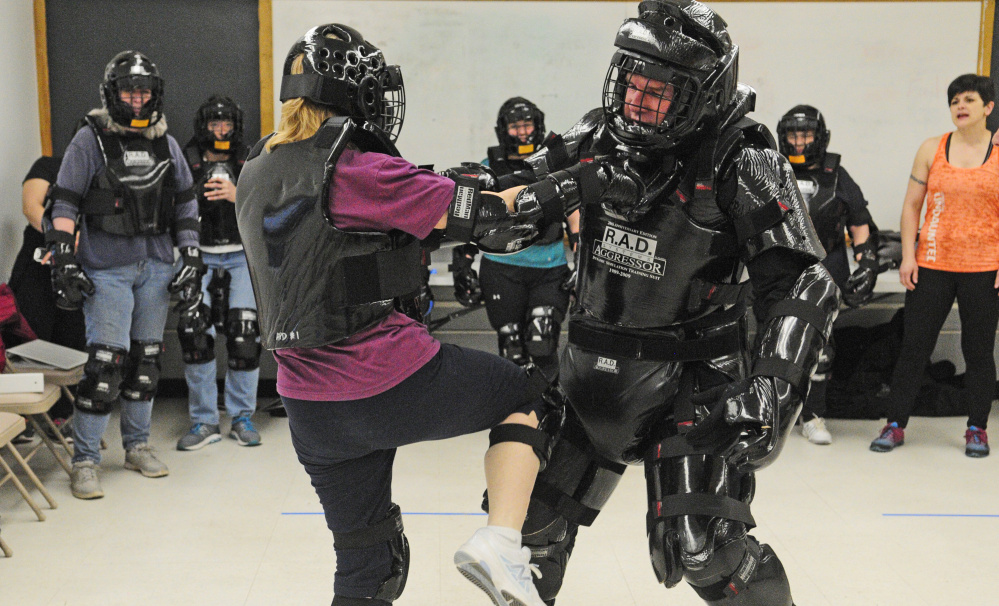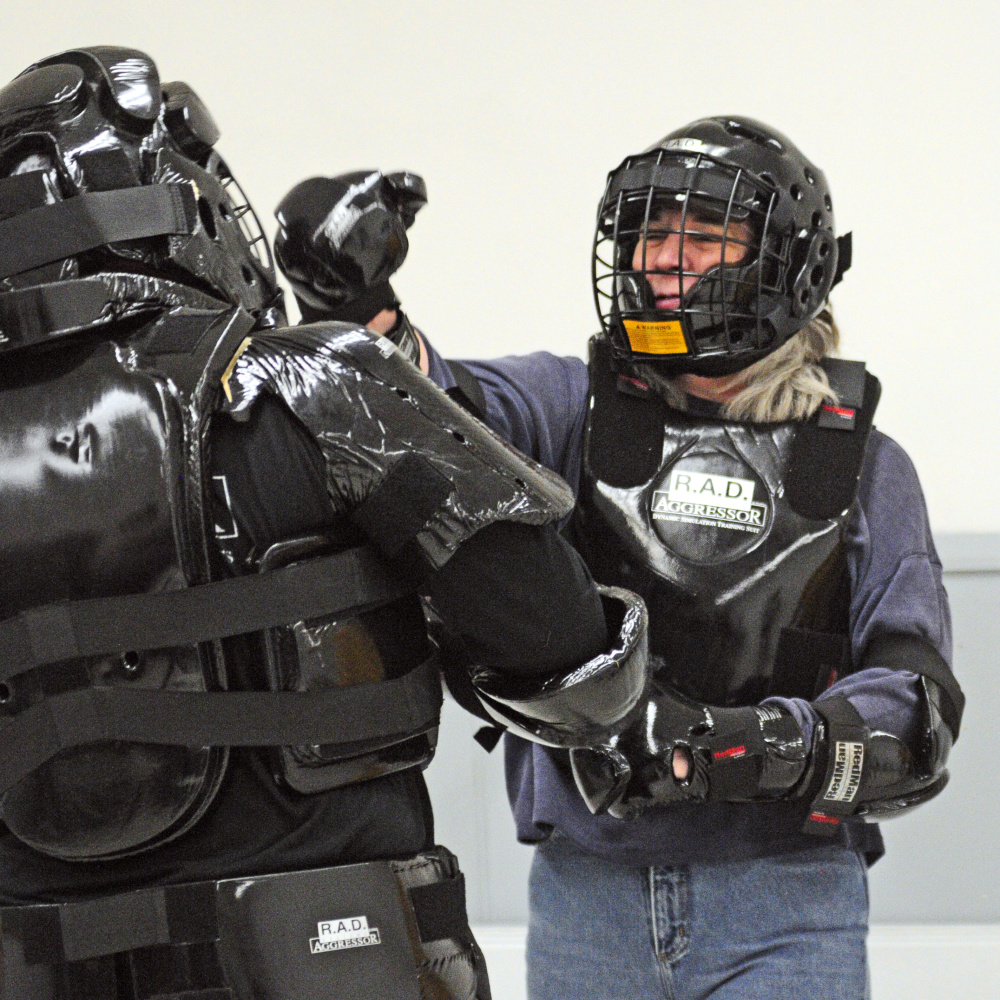AUGUSTA — A woman was preparing to take money out of an ATM at night. A large man walked up behind her, with questionable intentions and two friends at his side.
“Hey, want to come have a couple beers?” the man asked her suggestively. Then he demanded, “Come with me!”
The three men all crowded behind the woman, trying to grab her and pull her away. Another one yelled, “Ah, come on, sweetheart, you know you want some of this!”
The woman had prepared for this. She launched her knee into the first man’s crotch, and he doubled over with a groan. She punched and kicked the other two assailants. As they writhed on the floor, she fled.
Their altercation wasn’t on a dark street corner, but under the fluorescent lights of a classroom at Buker Community Center in Augusta. A group of women from high school to retirement age was just finishing a short class on self-defense.
As part of their fourth and final lesson, they had to demonstrate their defensive moves in a series of simulations. The ATM was imaginary, and the creepy male abductors were actually police officers playing the part. Both the women and the attackers wore large suits of padded armor – gloves, helmets, pads for the knees, elbows and chests.
The men wore additional padding on the lower half of their bodies, as the lead instructor, Augusta police Officer Carly Wiggin, coached the women through each scenario.
“Kick him in the groin!” Wiggin yelled as the women tussled with the men. “Now, get to the exit!”
After the class, several of the women described the initial fear they felt when the men attacked them, as well as the rush that accompanied fighting back.
“The first time I was intimidated, but by the last time I loved it,” one of them said.
Donna Dachs, 65, of Augusta said she learned of the self-defense course through Maine AARP and decided to take it after seeing what appeared to be a drug arrest happening near her home.
“I said, ‘I have to be prepared,’ ” she recalled. “You can lock your door. You can lock your garage, but you never know.”
In fact, locking your home is one of the lessons in the curriculum, said Brad Chase, an Augusta police officer who helped Wiggin teach the class – and who was one of three men to take a beating Thursday night. In an opening classroom session, students were taught to avoid risk by doing simple things like locking their doors when they are home or purchasing adequate window drapes.
In the second and third sessions, they’re taught the kicks, jabs and other strikes that are deployed in the final class.
Amanda Roggio, an officer in the Gardiner Police Department, is preparing to teach a self-defense class this summer and observed the one recently held in Augusta. After taking the course herself, she said she appreciates the simplicity of those strikes.
“I don’t have a good memory, and all the moves are simple and natural,” she said. “There’s not a lot … to remember.”
Dachs, the Augusta woman, agreed with that point.
“It’s empowering when you realize there’s something you can do,” she said. “It doesn’t have to be some action-packed move or something like that. It can be little things, like a flick kick, that are done in repetition.”
The class offered by the Augusta Police Department is based on a nationwide program known as Rape Aggression Defense Systems, or RAD.
The RAD curriculum was developed in 1989 and is geared toward women and children. It was first offered in Maine in 2002, after the murder of a 25-year-old woman named Amy St. Laurent. In 2001, St. Laurent disappeared after a night in Portland’s Old Port. Her body was found later, and in 2003 Jeffery “Russ” Gorman was convicted of having killed her after offering her a ride from a friend’s apartment.
St. Laurent’s family pushed the Portland Police Department to begin offering RAD classes and started a foundation to help fund that training.
The Augusta class is offered several times a year at no cost to the students, and is run by officers who are working on a voluntary basis.
The class includes other lessons for its students.
One of them, Wiggin said, is that sexual assaults are far more likely to be committed by someone familiar to the victim than by strangers.Students are also taught about the process for getting tested for rape at the hospital and reporting it to police, Wiggin said.
Another lesson is that, if a woman is being assaulted, defending herself won’t be a simple matter of deploying her favorite kick or punch, then escaping. Rather, it will require improvisation.
“There could be situations where you need to rely on your other senses, like if you’re running with ear buds in and can only see,” Wiggin said.
Another student, Ann Benson, 64, of West Gardiner, said Wiggin’s teaching had given her confidence that she could handle an attacker.
“You know that fight-or-flight feeling you get?” she said. “I won’t be fleeing. I will defend myself now.”
Charles Eichacker can be contacted at 621-5642 or at:
ceichacker@centralmaine.com
Twitter: ceichacker
Send questions/comments to the editors.





Success. Please wait for the page to reload. If the page does not reload within 5 seconds, please refresh the page.
Enter your email and password to access comments.
Hi, to comment on stories you must . This profile is in addition to your subscription and website login.
Already have a commenting profile? .
Invalid username/password.
Please check your email to confirm and complete your registration.
Only subscribers are eligible to post comments. Please subscribe or login first for digital access. Here’s why.
Use the form below to reset your password. When you've submitted your account email, we will send an email with a reset code.